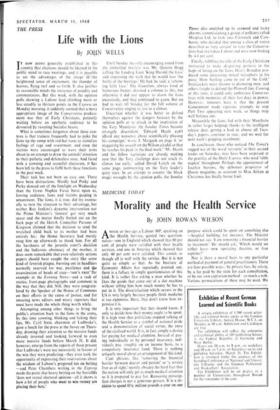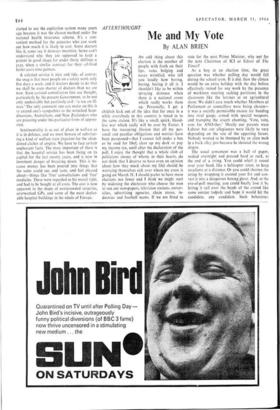MEDICINE TODAY
Morality and the Health Service
By JOHN ROWAN WILSON AWEEK or two ago a Labour MP, speaking on the Health Service, quoted two question- naires—one in England which showed that 80 per cent of people were satisfied with their health services, and one in America which showed that only 40 per cent were satisfied. This sounds as though all is well with the service. But it is not quite so simple as that. As the Institute of Economic Affairs has repeatedly pointed out, there is a fallacy in simple questionnaires of this kind. It is rather like asking a man whether he likes the goods that come out of a slot machine without telling him how much money he has to put in it. The dissatisfaction which occurs in the US is very largely because people think medicine is too expensive. Here, they don't know how ex- pensive it is.,
It is very important that they should know, if only to decide how their money ought to be spent. It is high time that politicians stopped talking of the Health Service as a symbol of national pride and a demonstration of social virtue, the envy of the civilised world. It is, in fact, simply a device for paying for medical attention. Instead of pay- ing individually or by personal insurance, indi- viduals pay. roughly on an income basis, to a compulsory insurance fund. There is nothing uniquely moral about an arrangement of this kind.
Cant phrases, like 'removing the financial barrier between doctor and patient' or 'a service free as of right,' merely obscure the hard fact that the nation will only get as much medical attention as it is prepared to pay for. Removing prescrip- tion charges is not a generous gesture. It is a de- cision to spend fifty million pounds a year on one purpose which could be spent on something else —hospital building, for instance. The Minister should not say. 'I am removing a financial barrier to treatment.' He should ask, 'Which would we rather have —new operating theatres, or free aspirins?'
Nor is there a moral basis to any particular method of payment of general practitioners. There are four possible ways: by private fees, by salary, by a fee paid by the state for each consultation, or by our own capitation method—so much a nob. Various permutations of these may be used. We started to use the capitation system many years ago because it was the chosen method under the national health insurance scheme. It's a con- venient method for the actuaries who can work out how much it is likely to cost. Some doctors like it, some say it destroys incentive. Some can't understand why they are supposed to keep a patient in good shape for under thirty shillings a year, when a similar contract for their oil-fired boiler costs nine guineas.
A salaried service is nice and tidy, of course; the snag is that most people on a salary work only five days a week, and if doctors decide to do that we shall be even shorter of doctors than we are now. State-assisted consultation fees are thought, particularly by the present Government, to be not only undesirable but positively evil----'a tax on ill- ness.' The only comment one can make on this is to extend one's sympathies to the wretched Scan- dinavians, Australians, and New Zealanders who are groaning under this particular form of oppres- sion.
Sentimentality is as out of place in welfare as it is in defence, and we must beware of substitut- ing a kind of welfare state jingoism for the aban- doned clichés of empire. We have to face certain unpleasant facts. The most important of these is that the hospital service has been living on its capital for the last twenty years, and is now in imminent danger of breaking down. This is be- cause money has been poured into things that the voter could see, and taste, and feel pleased about—things like 'free' consultations and 'free' medicine. These were regarded as his moral right, and had to be bought at all costs. The cost is now apparent in the shape of overcrowded surgeries, overworked GPs, and some of the most deplor- able hospital buildings in the whole of Europe.







































 Previous page
Previous page